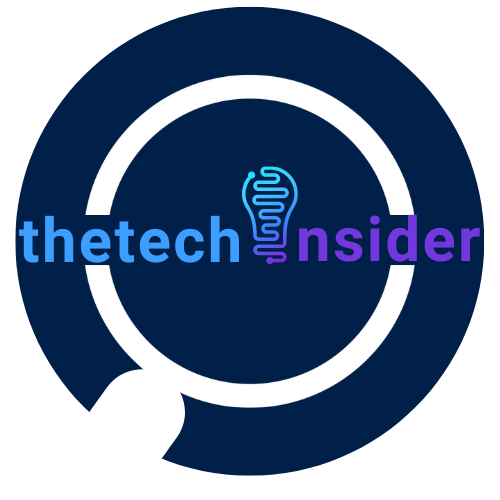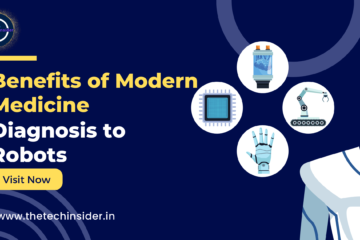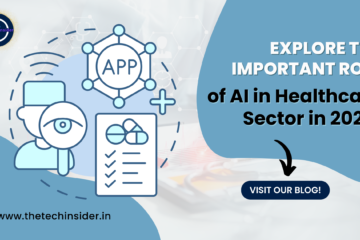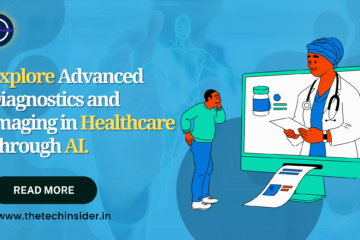Artificial intelligence (AI) is transforming how we interact, consume information, and obtain goods and services across industries. In health care, Artificial Intelligence is already changing the patient experience, how clinicians practice medicine, and how the pharmaceutical industry operates. The journey has just begun.
Table of Contents
Three categories for applications of Artificial Intelligence in Healthcare
The potential of Artificial Intelligence in healthcare spans a spectrum of tasks, varying from straightforward to intricate—encompassing activities like handling phone inquiries, reviewing medical records, analyzing population health trends, designing therapeutic drugs and devices, interpreting radiology images, formulating clinical diagnoses and treatment strategies, and engaging in conversations with patients.
The Benefits of AI in Healthcare
- Improved Diagnostics and Treatment Planning: Artificial Intelligence algorithms can analyze vast amounts of patient data, including medical records, imaging scans, and genetic information, to assist healthcare professionals in making accurate diagnoses and personalized treatment plans. This can lead to earlier detection of diseases, better prognoses, and more effective treatment strategies.
- Enhanced Patient Outcomes: By leveraging AI-driven predictive analytics, healthcare providers can identify patients at high risk of developing certain conditions or experiencing adverse events. This enables proactive interventions and preventive measures to be implemented, ultimately leading to improved patient outcomes and reduced hospital readmissions.
- Increased Efficiency and Productivity: AI-powered automation streamlines administrative tasks, such as scheduling appointments, managing medical records, and processing insurance claims, freeing healthcare professionals to focus more on direct patient care. This not only improves efficiency but also reduces administrative burdens and healthcare costs.
- Precision Medicine: Artificial Intelligence facilitates the development of precision medicine approaches by analyzing complex biological data to understand individual variations in disease susceptibility, treatment response, and drug interactions. This enables the delivery of tailored therapies that are more effective and have fewer adverse effects.
- Medical Imaging Interpretation: AI algorithms can analyze medical images, such as X-rays, MRIs, and CT scans, with high accuracy and speed, assisting radiologists in detecting abnormalities and diagnosing conditions earlier. This can lead to faster turnaround times for diagnostic results and more efficient triaging of patients.
- Diagnosis and Disease Prediction: AI-powered algorithms can analyze vast datasets, aiding in early disease detection and more accurate diagnosis. Machine learning models can predict disease risk based on patient data. AI accelerates drug discovery by analyzing molecular structures, predicting potential drug candidates, and optimizing clinical trial designs.
According to Statista, the artificial intelligence (AI) healthcare market, valued at $11 billion in 2021, is projected to be worth $187 billion in 2030. That massive increase means we will likely continue to see considerable changes in how medical providers, hospitals, pharmaceutical and biotechnology companies, and others in the healthcare industry operate
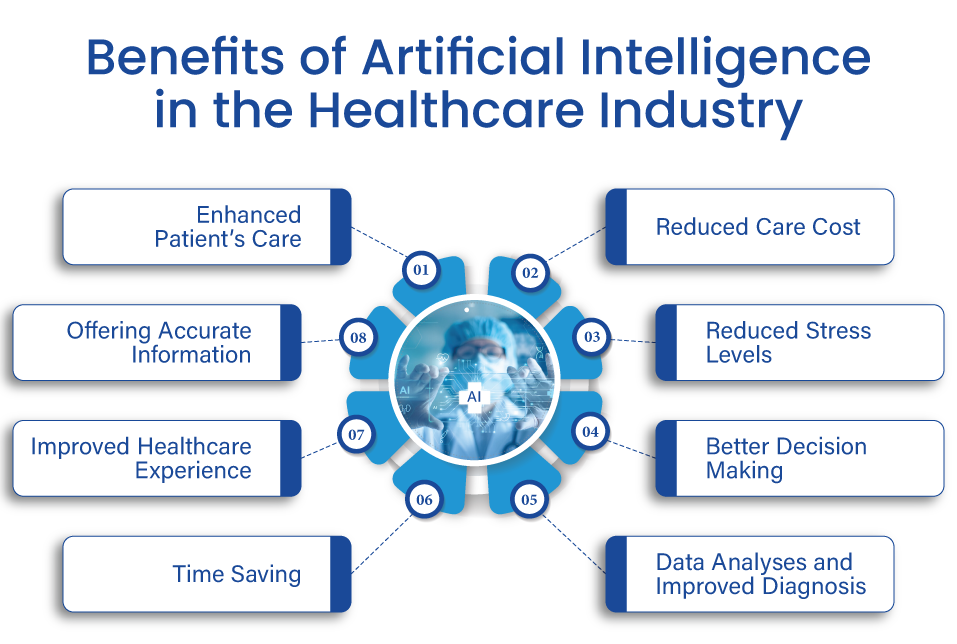
Future Scope of AI in Healthcare
The future and potential of AI in the healthcare ecosystem are vast and transformative. AI technologies are poised to revolutionize various aspects of healthcare delivery, including diagnostics, treatment planning, drug discovery, and patient care.
- Rephrase AI-Driven Imaging and Diagnostics: AI-powered imaging tools can accurately interpret medical images like X-rays and MRIs. Radiologists can leverage AI as a second opinion, improving diagnostic accuracy.
- Advancements in Genomics and Personalized Medicine: AI is poised to further our comprehension of genomics, facilitating customized treatment strategies based on an individual’s genetic makeup. This will result in more efficacious therapies and reduced instances of adverse reactions.
- Drug Discovery and Development: AI-driven drug discovery will expedite the identification of potential compounds for various diseases. It could lead to faster approval of new drugs and treatments.
- Transformation of Telemedicine and Remote Monitoring: AI-enhanced telemedicine platforms will facilitate remote patient surveillance, ensuring prompt interventions and alleviating strain on healthcare institutions.
- Predictive Analytics for Public Health: AI can analyze population health data to predict disease outbreaks, track trends, and allocate resources efficiently, enhancing public health management.
- Evolution of AI in Surgery: Continued development of robotic and AI-assisted surgical systems will enable minimally invasive procedures characterized by heightened precision and shortened recovery periods.
- Enhanced Public Health Management through Predictive Analytics: AI can analyze population health data, forecast disease outbreaks, track trends, and optimize resource allocation, bolstering public health administration.
Evolution of Mechanical Ventilation: From Clinician-Oriented to Patient-Oriented
Mechanical ventilation is the key intervention in the critically ill with respiratory failure. It provides temporary respiratory support for patient’s oxygenation and ventilation while they are fighting for their lives, and gives hope for recovery
The conventional modes of mechanical ventilation are volume-preset techniques that offer full or partial ventilatory support to the patient with respiratory insufficiency. The mode of ventilation is the aggregate of the mechanisms for initiation, limitation, and cycling of the ventilator.
Lately, there has been a shift in ventilator advancements towards approaches that prioritize patient needs and align more closely with physiological principles. This includes techniques like proportional assist ventilation and neurally adjusted ventilatory assist. Nevertheless, further research is necessary to fully understand the challenges associated with integrating these methods with patients’ neural and physiological dynamics. Current scientific inquiries into mechanical ventilation continue to prioritize patient safety and achieving synchronicity with their physiological rhythms.
The Future Of Smart Mechanical Ventilation
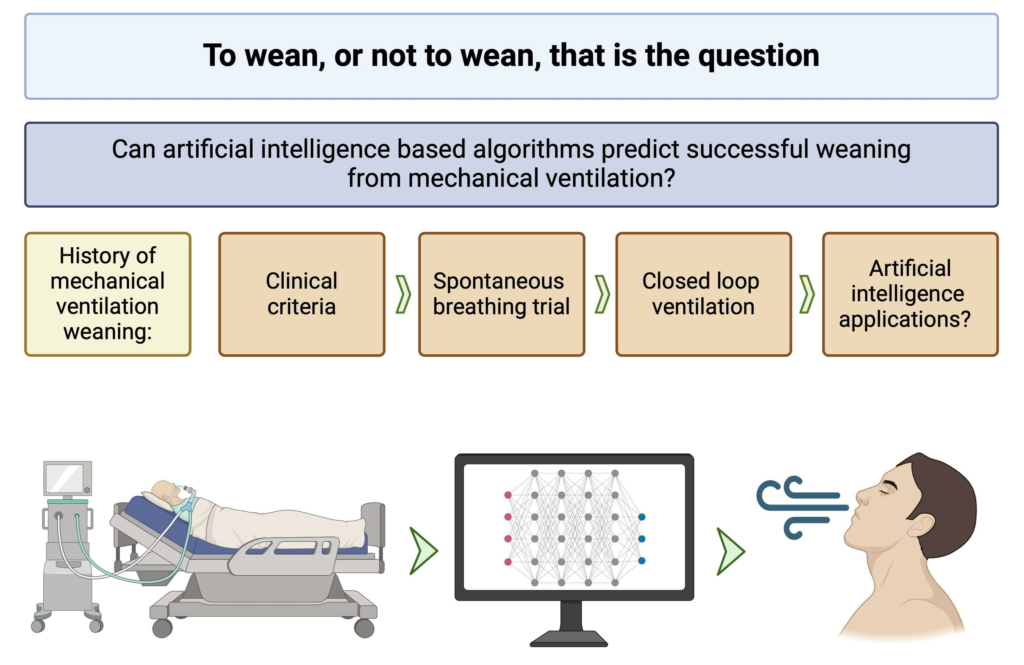
The future ventilator must possess the capability to not only provide sufficient oxygenation and ventilation but also to identify ineffective efforts or dysynchrony in the patient’s breathing patterns and adjust accordingly as the patient’s needs evolve throughout mechanical ventilation. Additionally, it should offer informative alarms to help clinicians recognize dysynchrony and empower patients to enhance their breathing efforts with minimal discomfort or interruptions. Achieving this requires the integration of high-precision sensors and the utilization of artificial intelligence to optimize ventilation based on the patient’s dynamic requirements.
Challenges and Considerations
- Data privacy and security: Safeguarding patient data against breaches and adhering to regulations such as HIPAA are of utmost importance.
- Bias and fairness: It’s essential to train AI algorithms on diverse datasets to prevent bias in decision-making, which may disproportionately impact specific demographics.
- Interoperability: Seamless integration of AI systems with current healthcare infrastructure is vital for broad acceptance and utilization.
- Ethical considerations: AI utilization must prioritize ethical practices, emphasizing decision-making transparency and patient well-being.
As we conclude, we want to thank you for being a part of The TechInsider community. We’re committed to updating you on the latest tech trends and innovations. With our team of experts, we strive to provide timely and insightful content that empowers you to stay ahead in the fast-paced world of technology. Your support drives us to explore new horizons and push boundaries. Together, let’s continue embracing the transformative power of technology. Stay informed, stay curious, and keep exploring with The TechInsider. Thank you for choosing us as your trusted source for tech insights.
Also, wanna know more about AI in Healthcare? Make sure to check out this blog of ours regarding:
